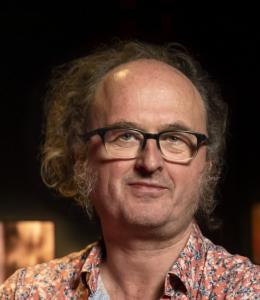
Dr Vic McEwan
Postdoctoral Fellow, November 2025 - January 2026
Home Institution: University of Sydney
Dr Vic McEwan is the Postdoctoral Research Associate in Creative Arts, Ecologies and Communities at the Sydney Conservatorium of Music (USyd). He is also the Artistic Director of multi-disciplinary arts organisation the Cad Factory, a multi-award-winning organisation known for its cross-sector, socially engaged artistic projects.
Vic’s role at the Sydney Conservatorium is part of Professor Liza Lim’s ARC Laureate Fellowship: Resonant Earth: Music, Ecology and Climate Justice. In this role, Vic is developing an innovative synthesis of creative research practice, environmental humanities scholarship, community engagement, cultural knowledges, and cross sector partnerships, to critically examine human and ecological entanglement across the Murray-Darling river system and beyond. His work explores how creative methods can contribute to multispecies justice and climate communication by creating new pathways for dialogue between artists, scientist, Indigenous Leaders, and water managers.
Vic's work explores the capacity for art to engage with social and environmental contexts through sound, music, photography, video, installation, sculpture and performance. His work has been presented in many site-specific locations nationally and internationally, as well as in more traditional venues such as the Tate Liverpool, National Museum of Australia, and numerous regional galleries across the country. His visual art practice is represented in NSW by the gallery Art Atrium.
Vic has established a strong reputation for leading large-scale, complex, and interdisciplinary socially engaged artistic projects that are exploratory, relational and emergent. His work is driven by collaboration and interdisciplinarity and has created partnerships with diverse stakeholders including communities, environments, science, business, government departments, and health services. He has 15 years’ experience in deep collaboration with First Nations communities and knowledge systems. As a co-founder of a national hub for socially engaged art practice, he has facilitated the negotiation of substantial partnerships with both national and international organisations, and has contributed to the professional development of 15 established socially engaged arts practitioners, nurturing their individual growth and the future of this field of practice. He is currently commissioned by Routledge as the lead author/editor for a new “Philosophy of Socially Engaged Art”.
Vic is a board member of Music NSW, the state’s peak body for Music, and a member of the Arts and Health Network NSW/ACT (AHNNA), and from 2023-24 he was a Regional Arts Australia National Fellow.
This IASH fellowship project extends my research on the Murray Darling River System in Australia, a deeply contested ecological and cultural landscape affected by colonisation, dispossession and ongoing interventions such as water management infrastructure, water allocation policies, and buy backs. Through an innovative synthesis of creative research practice and environmental humanities scholarship, this project critically explores human and ecological entanglements across the Murry-Darling Basin and beyond. It investigates how creative methods can contribute to multispecies justice, generating new pathways for dialogue between artists, scientist, indigenous leaders, and water managers.
This IASH fellowship will support the development of scholarly and creative research outputs including a journal article, an artistic installation, and a symposium. In January 2026 I will bring Barkindji Elders Aunty Barb Quayle and Aunty Cheryl Blore, along with Barkindji Artist Dave Doyle to co-host a panel event and documentary screening of the More than a Fisk Kill documentary. We will also create the foundations for a new sound and video installation engaging with ideas of displacement, colonisation, and environmental and cultural degradation, ‘haunting’ landscapes of colonial power with the voice and image of Aunty Barb Quayle, animated by atmospheric conditions.
As the impacts of climate change, water mismanagement, and Indigenous dispossession intensify, this project offers a timely investigation into how environmental humanities and creative practice can intervene in contested landscapes.
